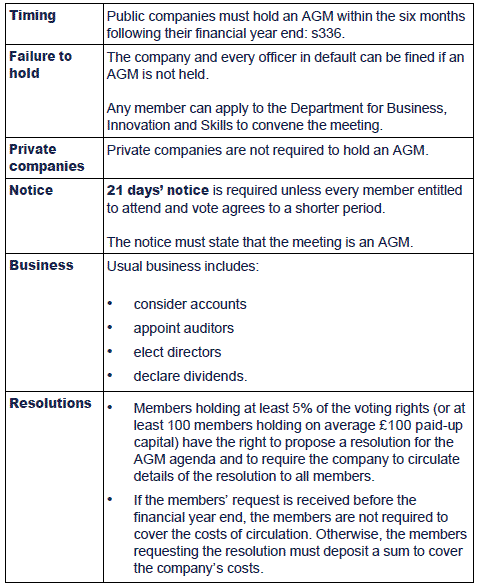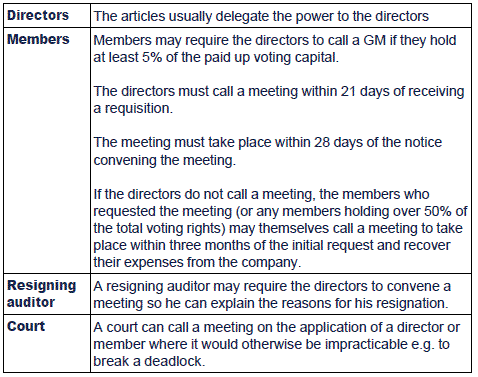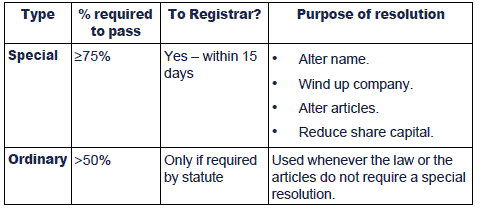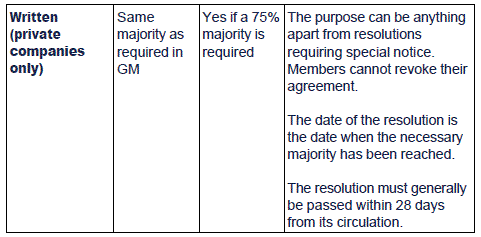Chapter 10: Corporate administration
Chapter learning objectives
Upon completion of this chapter you will be able to:
- discuss the appointment, duties and powers of, a company secretary
- discuss the appointment, duties and powers of, the company auditors
- distinguish between types of meetings: general meetings and annual general meetings
- explain the procedure for calling such meetings
- detail the procedure for conducting company meetings
- distinguish between types of resolutions: ordinary, special, and written.
1 Company secretary
Introduction
Every public company must have a qualified company secretary. Private companies may choose to appoint a secretary, but are not obliged to do so.
The secretary is usually appointed and removed by the directors.
Qualifications
The secretary of a public company must be qualified under one of the following conditions:
- They must have held the office of company secretary in a public limited company (plc) for at least three out of the preceding five years.
- They must be a solicitor, barrister or member of ICAEW, ACCA, CIMA, ICSA, CIPFA.
- They must appear to be capable of discharging the functions by virtue of another position or qualification.
Duties
There are no statutory duties, therefore the duties will be whatever the board decides. The company secretary will typically undertake the following:
- check that documentation is in order
- make returns to the registrar
- keep registers
- give notice and keep minutes of meetings
- countersign documents to which the company seal is affixed.
Powers
The company secretary has the authority to bind the company in contract. There are two types of authority:
- actual authority – this is the authority delegated by the board
- apparent authority regarding contracts of an administrative nature.
Panorama Developments (Guildford) v Fidelis Furnishing Fabrics (1971)
The company secretary ordered services for his own, not the company's, use. It was held that the contract was binding on the company as the contract was of the sort that a company secretary should be able to carry out.
'He is no longer a mere clerk…He is entitled to sign contracts connected with the administrative side of a company's affairs, such as employing staff, and ordering cars, and so forth.'
However, two other cases indicate that there is a limit to the company secretary's authority:
- It does not extend to making commercial as opposed to administrative contracts: Re Maidstone Building Provisions (1971).
- It does not usually carry the authority to borrow money: Re Cleadon Trust Ltd (1938).

 Test your understanding 1
Test your understanding 1
In relation to the company secretary, which one of the following statements is correct?
ABoth a public and a private company must have a company secretary.
BThe company secretary is appointed by the members.
CIn a public company the company secretary must be qualified.
DCompany secretaries can bind companies in a contract if acting outside their actual or apparent authority.

2 The auditor
Qualifications
The auditor must be either:
- a member of recognised supervisory body (ICAEW, ICAS or ACCA) and eligible under their rules, or
- qualified by a similar overseas body and authorised by the Department for Business, Innovation and Skills.
The auditor must not be:
- an officer or employee of the company
- the partner of an officer or employee of the company.
Appointment
The auditors should generally be appointed by the shareholders by ordinary resolution. However, the directors can appoint the company's first auditor and fill casual vacancies.
A company must inform the Secretary of State if it has failed to appoint an auditor within 28 days of circulating its accounts. The Secretary of State has power to appoint an auditor in those circumstances.
Audit exemption for small companies
For financial years starting on or after 6 April 2008, to qualify for total audit exemption a company must:
- have a turnover of not more than £6.5m; and
- have gross assets not more than £3.26m.
However, these exemptions do not apply to public companies, banking or insurance companies or those subject to a statute-based regulatory regime.
Resignation
An auditor can resign at any time by giving written notice to the company: s516 CA06.
The resignation is effective from the date it is delivered to the company's registered office, or from a specified later date. To be effective it must be accompanied by the statement required by s519 (see below).
A company whose auditor resigns is required to inform the registrar: s517 CA06. Failure to do so is an offence.
Under s518 CA06, an auditor who resigns can require the directors to convene a general meeting to consider his explanation of the circumstances that led to his resignation. The directors have 21 days to send out a notice convening a meeting and it must be held within 28 days of the notice.
Removal
An auditor can be removed by ordinary resolution: s510 CA06. The resolution must be passed at a general meeting; a written resolution cannot be used to remove an auditor.
Special notice of the resolution is needed (i.e. 28 days). The company must send a copy of the resolution to the auditor and he has the right to make a statement of his case. The company then has to circulate his statement to the shareholders. However, if time does not allow for circulation, the statement can be read out at the meeting.
Notice of the resolution removing the auditor must be sent to the Registrar within 14 days.
Statement by departing auditor
Under s519 CA06, a departing auditor is required to make a statement and to deposit it with the company:
- For quoted companies, this statement must explain the circumstances surrounding his departure.
- For other public companies and all private companies, it should explain the circumstances surrounding his departure, unless the auditor thinks that there is no need for them to be brought to the attention of the shareholders or creditors. In that case, the statement should state that there are no such circumstances.
Unless there are no circumstances to be brought to the attention of shareholders and creditors, the company is obliged to circulate the statement to everyone to whom it needs to send the annual accounts. It must do this within 14 days of receiving it.
If the company does not want to circulate the statement, it can apply to the court for an order that it need not circulate the statement.
Duties
The auditor has a statutory duty to report to the members on whether the accounts:
- give a true and fair view and
- have been properly prepared in accordance with the Companies Act and the relevant financial reporting framework.
The auditor must investigate and form an opinion as to whether:
- proper books of accounting records have been kept
- proper returns adequate for their audit have been received from branches not visited by them
- the accounts are in agreement with the books of account and returns
- the information given in the directors' report is consistent with the accounts.
If the auditor is dissatisfied with the findings of his investigation he must qualify the audit report.
The report (whether qualified or unqualified) must state the name of the audit firm, or if an individual has been appointed as auditor, his name. Where the auditor is a firm, the senior statutory auditor must sign the report in his own name on behalf of the firm.
Under s507 CA06 it is a criminal offence to knowingly or recklessly cause an audit report to include anything that is misleading, false or deceptive, or to omit a required statement of a problem with the accounts or audit. The offence carries an unlimited fine.
There could also be liability under the tort of negligence for including misleading accounts (see Chapter 3).
Companies Act liability for auditor's report and audited accounts
s507 of the Companies Act 2006 (s507 CA06) makes it an offence for an auditor to recklessly cause an auditor's report to contain any matter that is misleading or false to a material extent. The offence is punishable by a fine.
s532 CA06 makes any provision exempting auditors from or indemnifying them against liability for negligence void in relation to providing audited accounts.
s534 CA06 provides that a company may enter into a liability limitation agreement with an auditor, limiting his liability for negligence (among other things) in the course of auditing accounts.
Powers
The auditor has the right to:
- receive notice of, attend and speak at general meetings.
- access the books at all times
- require such information and explanations from the company's officers and employees as the auditor thinks fit for the performance of his duties (it is a criminal offence to fail to provide the information requested, unless it was not reasonably practicable to do so).

 Test your understanding 2
Test your understanding 2
If a company's auditor is to be removed before his term of office expires, what type of resolution is required and what period of notice must be given?

3 Meetings
Annual general meeting (AGM)

General meetings (GM)

Class meetings

4 Calling a meeting
Who can call a meeting?

Notice

5 Resolutions
Resolutions are the way in which companies take decisions. They are voted on by the members in person or by proxy. There are three types of resolution:



 Test your understanding 3
Test your understanding 3
Fill in the gaps:
(1)An annual general meeting requires ……..days’ notice.
(2)Members may require the directors to call a GM if they hold at least ….% of the paid up voting capital
(3)Special notice requires …. days’ notice.
(4)A special resolution must be filed with the Registrar within …. days.

6 Procedure at meetings
 A quorum is the minimum number of members that needs to be present at a meeting in order to validate business. It is generally two persons who can be members or proxies: s318 CA06.
A quorum is the minimum number of members that needs to be present at a meeting in order to validate business. It is generally two persons who can be members or proxies: s318 CA06.
Voting is by a show of hands initially, unless a poll is demanded. A show of hands means one member one vote, irrespective of the number of shares held.
A poll may be demanded by members holding at least 10% of the total voting rights (or by not fewer than 5 members having the right to vote on the resolution). A poll means one vote per share. The result of a poll replaces the result of the previous show of hands. Quoted companies must publish the results of polls on their website: s341 CA06.
Members have a statutory right under s 324 CA06 to appoint one or more persons as their ' proxy '. A proxy can attend meetings, vote and speak on behalf of the member for whom he is acting.
7 Chapter summary
Test your understanding answers

 Test your understanding 1
Test your understanding 1
COnly a public company is required to have a company secretary. The secretary is appointed by the directors and must be qualified. To bind a company, the secretary must be acting within his actual and/or apparent authority.


 Test your understanding 2
Test your understanding 2
Removal of an auditor before his term of office expires requires an ordinary resolution of which 28 days' special notice has been given.


 Test your understanding 3
Test your understanding 3
(1) An annual general meeting requires 21 days’ notice.
(2) Members may require the directors to call a GM if they hold at least 5% of the paid up voting capital
(3) Special notice requires 28 days’ notice.
(4) A special resolution must be filed with the Registrar within 15 days.

|
Created at 5/24/2012 3:22 PM by System Account
(GMT) Greenwich Mean Time : Dublin, Edinburgh, Lisbon, London
|
Last modified at 8/21/2012 2:05 PM by System Account
(GMT) Greenwich Mean Time : Dublin, Edinburgh, Lisbon, London
|
|
|
|
 |
Rating
:
|
 Ratings & Comments
(Click the stars to rate the page) Ratings & Comments
(Click the stars to rate the page)
|
 |
Tags:
|
|
|
|
|